Deck 22: Agriculture: Economics and Policy
Question
Question
Question
Question
Question
Question
Question
Question
Question
Question
Question
Question
Question
Question
Question
Question
Question
Question
Question
Question
Question
Question
Question
Question
Question
Question
Question
Question
Question
Question
Question
Question
Question
Question
Question
Question
Question
Question
Question
Question
Question
Question
Question
Question
Question
Question
Question
Question
Question
Question
Question
Question
Question
Question
Question
Question
Question
Question
Question
Question
Question
Question
Question
Question
Question
Question
Question
Question
Question
Question
Question
Question
Question
Question
Question
Question
Question
Question
Question
Question

Unlock Deck
Sign up to unlock the cards in this deck!
Unlock Deck
Unlock Deck
1/265
Play
Full screen (f)
Deck 22: Agriculture: Economics and Policy
1
The Food, Conservation, and Energy Act of 2008 provided three types of agricultural subsidies: direct payments, countercyclical payments, and marketing loans.
True
2
Agriculture is overcrowded because of absolute and relative increases in the size of farm employment.
False
3
If prices received by farmers decline and prices paid by farmers increase, the parity ratio will decline.
True
4
Farmers typically sell their products in highly competitive markets and buy in imperfectly competitive markets.

Unlock Deck
Unlock for access to all 265 flashcards in this deck.
Unlock Deck
k this deck
5
The Agricultural Act of 2014 expanded the direct payments, countercyclical payments, and marketing loans provided by the Food, Conservation, and Energy Act of 2008.

Unlock Deck
Unlock for access to all 265 flashcards in this deck.
Unlock Deck
k this deck
6
The increasing relative importance of agricultural exports has increased the instability of the demand for U.S. farm products.

Unlock Deck
Unlock for access to all 265 flashcards in this deck.
Unlock Deck
k this deck
7
The principal beneficiaries of government agricultural aid have been the very low-income farmers.

Unlock Deck
Unlock for access to all 265 flashcards in this deck.
Unlock Deck
k this deck
8
The price elasticity of demand for most agricultural products is relatively low.

Unlock Deck
Unlock for access to all 265 flashcards in this deck.
Unlock Deck
k this deck
9
Environmentalists generally support price supports because these subsidies motivate additional farm production.

Unlock Deck
Unlock for access to all 265 flashcards in this deck.
Unlock Deck
k this deck
10
An increase in the supply of farm products relative to the demand for them tends to cause farm incomes to decline.

Unlock Deck
Unlock for access to all 265 flashcards in this deck.
Unlock Deck
k this deck
11
Increases in incomes usually result in more than proportionate increases in the demand for agricultural products in a growing economy.

Unlock Deck
Unlock for access to all 265 flashcards in this deck.
Unlock Deck
k this deck
12
About 10 percent of the U.S. labor force is in agriculture.

Unlock Deck
Unlock for access to all 265 flashcards in this deck.
Unlock Deck
k this deck
13
The use of price-support programs in agriculture has hastened the exodus of resources from agriculture.

Unlock Deck
Unlock for access to all 265 flashcards in this deck.
Unlock Deck
k this deck
14
The concept of parity has provided a rationale for government price supports for farm products.

Unlock Deck
Unlock for access to all 265 flashcards in this deck.
Unlock Deck
k this deck
15
The federal government has not paid subsidies to farmers since passage of the Freedom to Farm Act in 1996.

Unlock Deck
Unlock for access to all 265 flashcards in this deck.
Unlock Deck
k this deck
16
The Agricultural Act of 2014 created two new crop insurance programs, agricultural risk coverage and price loss coverage.

Unlock Deck
Unlock for access to all 265 flashcards in this deck.
Unlock Deck
k this deck
17
If the demand for agricultural products is inelastic, a relatively small increase in supply will cause farm prices and incomes to decline.

Unlock Deck
Unlock for access to all 265 flashcards in this deck.
Unlock Deck
k this deck
18
Agricultural risk coverage guarantees payments to farmers when the price of their crop falls below a specific value.

Unlock Deck
Unlock for access to all 265 flashcards in this deck.
Unlock Deck
k this deck
19
Due to high fixed costs relative to variable costs in farming, farm production is quite sensitive to price changes in the short run.

Unlock Deck
Unlock for access to all 265 flashcards in this deck.
Unlock Deck
k this deck
20
The Agricultural Act of 2018 ended the crop insurance programs created by the Agricultural Act of 2014.

Unlock Deck
Unlock for access to all 265 flashcards in this deck.
Unlock Deck
k this deck
21
As a nation's average household income rises, the percentage of household income that goes to food expenditures also increases.

Unlock Deck
Unlock for access to all 265 flashcards in this deck.
Unlock Deck
k this deck
22
The percentage of total employment in the U.S. that is accounted for by farms has been declining in the last six decades or so, but the absolute number of farm employment has actually risen slightly over those decades.

Unlock Deck
Unlock for access to all 265 flashcards in this deck.
Unlock Deck
k this deck
23
Public policy has been ineffective in alleviating the resource misallocation problem in American agriculture.

Unlock Deck
Unlock for access to all 265 flashcards in this deck.
Unlock Deck
k this deck
24
The parity ratio initially stood at 0.5. Then after several years, the prices received by farmers doubled while the prices they paid tripled. This will bring the parity ratio to
A)0.25.
B)0.33.
C)0.75.
D)0.80.
A)0.25.
B)0.33.
C)0.75.
D)0.80.

Unlock Deck
Unlock for access to all 265 flashcards in this deck.
Unlock Deck
k this deck
25
Price support programs for agricultural products tend to cause shortages of these products.

Unlock Deck
Unlock for access to all 265 flashcards in this deck.
Unlock Deck
k this deck
26
The farm price-support programs hurt consumers of the farm products, and moreover, the burden tends to be disproportionately heavier on the low-income consumers.

Unlock Deck
Unlock for access to all 265 flashcards in this deck.
Unlock Deck
k this deck
27
Domestic farm subsidies improve world trade and contribute to greater efficiency in the international allocation of agricultural resources.

Unlock Deck
Unlock for access to all 265 flashcards in this deck.
Unlock Deck
k this deck
28
Technological advances have occurred throughout the history of agriculture, resulting in higher productivity but lower incomes to farmers.

Unlock Deck
Unlock for access to all 265 flashcards in this deck.
Unlock Deck
k this deck
29
The Freedom to Farm Act of 1996 aimed to eliminate agricultural price supports and acreage allotments for many crops.

Unlock Deck
Unlock for access to all 265 flashcards in this deck.
Unlock Deck
k this deck
30
A parity ratio of 1.2 in year A means that prices
A)received in year A could buy 120 percent as much as prices received in the base period.
B)received in the base period could buy 120 percent as much as prices received in year A.
C)received in year A had risen by 120 percent over the prices received in the base period.
D)paid by farmers in year A had risen by 120 percent over the prices paid in the base period.
A)received in year A could buy 120 percent as much as prices received in the base period.
B)received in the base period could buy 120 percent as much as prices received in year A.
C)received in year A had risen by 120 percent over the prices received in the base period.
D)paid by farmers in year A had risen by 120 percent over the prices paid in the base period.

Unlock Deck
Unlock for access to all 265 flashcards in this deck.
Unlock Deck
k this deck
31
Agricultural price-support programs result in consumers paying lower prices for the product.

Unlock Deck
Unlock for access to all 265 flashcards in this deck.
Unlock Deck
k this deck
32
The Food, Conservation, and Energy Act of 2008 provided farm subsidies in the form of direct payments, countercyclical payments, and marketing loans to farmers.

Unlock Deck
Unlock for access to all 265 flashcards in this deck.
Unlock Deck
k this deck
33
An example of the special interest effect is a farm program from which a large group receives small benefits at the expense of a smaller group who individually suffer large losses.

Unlock Deck
Unlock for access to all 265 flashcards in this deck.
Unlock Deck
k this deck
34
If the parity ratio goes from 1 to 0.8, it means that the prices received by farmers had
A)fallen by 20 percent relative to the prices they paid.
B)fallen by 25 percent relative to the prices they paid.
C)risen by 20 percent relative to the prices they paid.
D)risen by 25 percent relative to the prices they paid.
A)fallen by 20 percent relative to the prices they paid.
B)fallen by 25 percent relative to the prices they paid.
C)risen by 20 percent relative to the prices they paid.
D)risen by 25 percent relative to the prices they paid.

Unlock Deck
Unlock for access to all 265 flashcards in this deck.
Unlock Deck
k this deck
35
The movement to eliminate agricultural subsidies in the U.S. and make farmers rely more on market forces, starting with the Farm Act of 1996, continues to this day.

Unlock Deck
Unlock for access to all 265 flashcards in this deck.
Unlock Deck
k this deck
36
The 2014 Agriculture Act in the U.S. eliminated farm subsidies so as to encourage farmers to move their resources to nonfarming production activities.

Unlock Deck
Unlock for access to all 265 flashcards in this deck.
Unlock Deck
k this deck
37
The price and income support programs for agriculture have given the most benefit to those farmers with the most need for the government assistance.

Unlock Deck
Unlock for access to all 265 flashcards in this deck.
Unlock Deck
k this deck
38
If in a certain year the indices of prices received and paid by farmers were 125 and 160, respectively, the parity ratio (in percentage terms)would be approximately
A)128.
B)78.
C)65.
D)35.
A)128.
B)78.
C)65.
D)35.

Unlock Deck
Unlock for access to all 265 flashcards in this deck.
Unlock Deck
k this deck
39
Farmers, though a small proportion of the population, can impose a large total cost to taxpayers in the form of agricultural subsidies because the average cost imposed on each individual taxpayer is small and not given much attention by a large number of taxpayers.

Unlock Deck
Unlock for access to all 265 flashcards in this deck.
Unlock Deck
k this deck
40
The parity concept of agricultural policy suggests that farmers should obtain a constant ratio of the prices they receive for their farm products and the prices they pay for goods and services in general.

Unlock Deck
Unlock for access to all 265 flashcards in this deck.
Unlock Deck
k this deck
41
 Refer to the table. If government adopts a price support program that sets the price at $7, then the total amount that government will pay to farmers of this product is
Refer to the table. If government adopts a price support program that sets the price at $7, then the total amount that government will pay to farmers of this product isA)$980.
B)$560.
C)$180.
D)$1,540.

Unlock Deck
Unlock for access to all 265 flashcards in this deck.
Unlock Deck
k this deck
42
The demand for agricultural products
A)has a price elasticity coefficient of about 0.20 to 0.25.
B)is elastic with respect to income but inelastic with respect to price.
C)has been decreasing about 8 percent per year.
D)has been rising more rapidly than the national income.
A)has a price elasticity coefficient of about 0.20 to 0.25.
B)is elastic with respect to income but inelastic with respect to price.
C)has been decreasing about 8 percent per year.
D)has been rising more rapidly than the national income.

Unlock Deck
Unlock for access to all 265 flashcards in this deck.
Unlock Deck
k this deck
43
The demand for agricultural products is
A)relatively elastic with respect to price.
B)relatively inelastic with respect to price.
C)relatively elastic with respect to income.
D)downsloping to the individual farmer but perfectly elastic to farmers as a group.
A)relatively elastic with respect to price.
B)relatively inelastic with respect to price.
C)relatively elastic with respect to income.
D)downsloping to the individual farmer but perfectly elastic to farmers as a group.

Unlock Deck
Unlock for access to all 265 flashcards in this deck.
Unlock Deck
k this deck
44
Farm share of U.S. GDP has
A)declined from about 12 percent in 1950 to 1 percent today.
B)declined from about 12 percent in 1950 to 7 percent today.
C)declined from about 7 percent in 1950 to 1 percent today.
D)remained relatively stable over the past 50 years.
A)declined from about 12 percent in 1950 to 1 percent today.
B)declined from about 12 percent in 1950 to 7 percent today.
C)declined from about 7 percent in 1950 to 1 percent today.
D)remained relatively stable over the past 50 years.

Unlock Deck
Unlock for access to all 265 flashcards in this deck.
Unlock Deck
k this deck
45
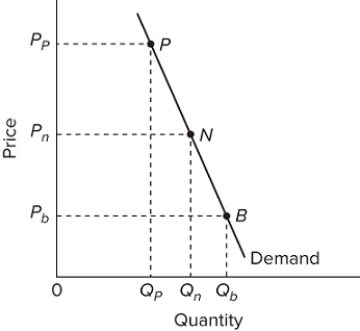 Refer to the diagram. If farmers produce a normal crop of Qₙ , their gross income
Refer to the diagram. If farmers produce a normal crop of Qₙ , their gross incomeA)will be 0 Pₚ PNQₙ .
B)will be 0 Pₙ NQₙ .
C)will be Pₚ × Qₙ .
D)cannot be determined.

Unlock Deck
Unlock for access to all 265 flashcards in this deck.
Unlock Deck
k this deck
46
 Refer to the table. If government adopts a price support program that sets the price at $9, then there will be a
Refer to the table. If government adopts a price support program that sets the price at $9, then there will be aA)shortage of 100 bushels.
B)surplus of 100 bushels.
C)surplus of 120 bushels.
D)surplus of 160 bushels.

Unlock Deck
Unlock for access to all 265 flashcards in this deck.
Unlock Deck
k this deck
47
 Refer to the table. In a competitive market for this agricultural product, the equilibrium price and output level will be
Refer to the table. In a competitive market for this agricultural product, the equilibrium price and output level will beA)$5 and 140 bushels.
B)$6 and 180 bushels.
C)$6 and 140 bushels.
D)$7 and 220 bushels.

Unlock Deck
Unlock for access to all 265 flashcards in this deck.
Unlock Deck
k this deck
48
 Refer to the table. If government adopts a price support program that sets the price at $9, then the total amount that private buyers would pay for this agricultural product is
Refer to the table. If government adopts a price support program that sets the price at $9, then the total amount that private buyers would pay for this agricultural product isA)$300.
B)$900.
C)$1,800.
D)$2,700.

Unlock Deck
Unlock for access to all 265 flashcards in this deck.
Unlock Deck
k this deck
49
The price of a certain farm product was $2.00 in the base period when the parity ratio was 100. If the index of prices paid by farmers is now at 130, then the parity price of this farm product today should be
A)1.40.
B)2.60.
C)2.30.
D)1.70.
A)1.40.
B)2.60.
C)2.30.
D)1.70.

Unlock Deck
Unlock for access to all 265 flashcards in this deck.
Unlock Deck
k this deck
50
The demand for most agricultural products is
A)elastic with respect to price but inelastic with respect to income.
B)inelastic with respect to price but elastic with respect to income.
C)elastic with respect to both price and income.
D)inelastic with respect to both price and income.
A)elastic with respect to price but inelastic with respect to income.
B)inelastic with respect to price but elastic with respect to income.
C)elastic with respect to both price and income.
D)inelastic with respect to both price and income.

Unlock Deck
Unlock for access to all 265 flashcards in this deck.
Unlock Deck
k this deck
51
What percentage of their spending do U.S. consumers allocate to food purchases?
A)1 percent.
B)7 percent.
C)10 percent.
D)13 percent.
A)1 percent.
B)7 percent.
C)10 percent.
D)13 percent.

Unlock Deck
Unlock for access to all 265 flashcards in this deck.
Unlock Deck
k this deck
52
In the United States, "farm products" are generally produced in more ___________ markets, while "food products" tend to be sold in markets that are more ____________.
A)monopolistic; competitive
B)competitive; oligopolistic
C)oligopolistic; competitive
D)oligopolistic; monopolistic
A)monopolistic; competitive
B)competitive; oligopolistic
C)oligopolistic; competitive
D)oligopolistic; monopolistic

Unlock Deck
Unlock for access to all 265 flashcards in this deck.
Unlock Deck
k this deck
53
If the demand for an agricultural product is inelastic, a bumper crop will
A)raise price and decrease total revenues.
B)raise price and increase total revenues.
C)lower price and decrease total revenues.
D)lower price and increase total revenues.
A)raise price and decrease total revenues.
B)raise price and increase total revenues.
C)lower price and decrease total revenues.
D)lower price and increase total revenues.

Unlock Deck
Unlock for access to all 265 flashcards in this deck.
Unlock Deck
k this deck
54
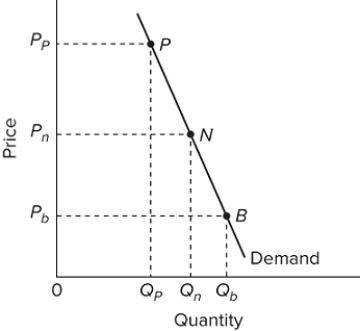 Refer to the diagram. If output changes from a poor crop, Qₚ , to a bumper crop, Qᵦ ,
Refer to the diagram. If output changes from a poor crop, Qₚ , to a bumper crop, Qᵦ ,A)farm incomes will decrease.
B)farm incomes will increase.
C)price and quantity will both increase.
D)farm incomes may either rise or fall.

Unlock Deck
Unlock for access to all 265 flashcards in this deck.
Unlock Deck
k this deck
55
Which of the following statements best describes the demand for agricultural commodities?
A)It takes a small decline in price to induce a large increase in the amount of agricultural products demanded.
B)The marginal utility of additional units of agricultural output diminishes very rapidly.
C)Small increases in income cause demand to increase by a proportionately larger amount.
D)When price declines, the resulting substitution effect is very large.
A)It takes a small decline in price to induce a large increase in the amount of agricultural products demanded.
B)The marginal utility of additional units of agricultural output diminishes very rapidly.
C)Small increases in income cause demand to increase by a proportionately larger amount.
D)When price declines, the resulting substitution effect is very large.

Unlock Deck
Unlock for access to all 265 flashcards in this deck.
Unlock Deck
k this deck
56
The demand for agricultural products rises less rapidly than income. This means that the demand for agricultural products is
A)income inelastic.
B)income elastic.
C)price inelastic.
D)price elastic.
A)income inelastic.
B)income elastic.
C)price inelastic.
D)price elastic.

Unlock Deck
Unlock for access to all 265 flashcards in this deck.
Unlock Deck
k this deck
57
Which of the following best describes the short-run problem faced by farms?
A)New technology has increased the productivity of farmers and therefore resulted in declining farm prices and low farm incomes.
B)The highly inelastic nature of agricultural demand, together with fluctuations in exports of farm goods, has caused small year-to-year fluctuations in farm output to result in highly unstable farm incomes.
C)The supply of farm products has increased relative to the demand for them, and because demand is inelastic, prices of farm output and farm income have therefore declined.
D)The demand for farm products has increased relative to their supply, but the elastic nature of agricultural demand has caused these shifts to result in declining farm incomes.
A)New technology has increased the productivity of farmers and therefore resulted in declining farm prices and low farm incomes.
B)The highly inelastic nature of agricultural demand, together with fluctuations in exports of farm goods, has caused small year-to-year fluctuations in farm output to result in highly unstable farm incomes.
C)The supply of farm products has increased relative to the demand for them, and because demand is inelastic, prices of farm output and farm income have therefore declined.
D)The demand for farm products has increased relative to their supply, but the elastic nature of agricultural demand has caused these shifts to result in declining farm incomes.

Unlock Deck
Unlock for access to all 265 flashcards in this deck.
Unlock Deck
k this deck
58
Which of the following would, other things equal, increase the demand for U.S. farm products?
A)poorer crops abroad
B)appreciation of the U.S. dollar
C)deteriorating trade relations with China and Russia
D)increases in foreign tariffs on imported farm products
A)poorer crops abroad
B)appreciation of the U.S. dollar
C)deteriorating trade relations with China and Russia
D)increases in foreign tariffs on imported farm products

Unlock Deck
Unlock for access to all 265 flashcards in this deck.
Unlock Deck
k this deck
59
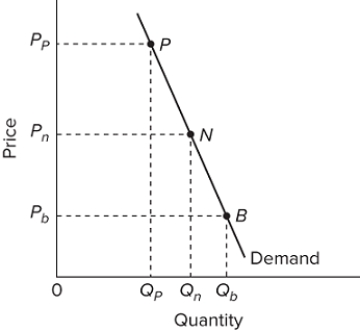 Refer to the diagram. If farmers produce a bumper crop of Qᵦ , their gross income
Refer to the diagram. If farmers produce a bumper crop of Qᵦ , their gross incomeA)will be 0 Pₚ PBQᵦ .
B)will be 0 Pᵦ BQᵦ .
C)will be Pᵦ × Qₙ .
D)cannot be determined.

Unlock Deck
Unlock for access to all 265 flashcards in this deck.
Unlock Deck
k this deck
60
Which of the following would, other things equal, reduce the demand for U.S. farm products?
A)poorer crops abroad
B)strong economic growth abroad
C)improved trade relations with China and Russia
D)appreciation of the U.S. dollar
A)poorer crops abroad
B)strong economic growth abroad
C)improved trade relations with China and Russia
D)appreciation of the U.S. dollar

Unlock Deck
Unlock for access to all 265 flashcards in this deck.
Unlock Deck
k this deck
61
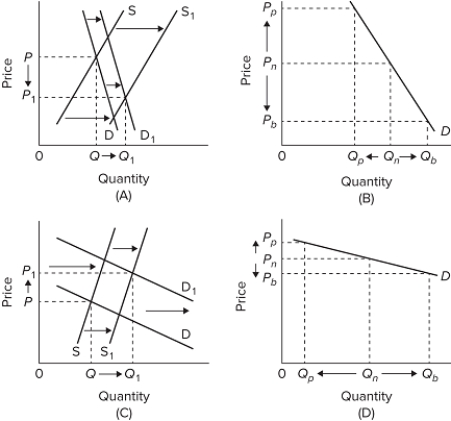 Which diagram best represents the problem faced by farms in the short run?
Which diagram best represents the problem faced by farms in the short run?A)A
B)B
C)C
D)D

Unlock Deck
Unlock for access to all 265 flashcards in this deck.
Unlock Deck
k this deck
62
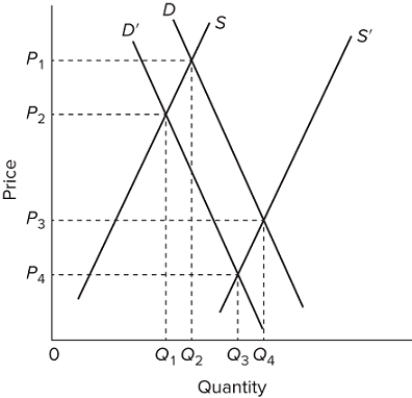 The problem faced by farms in the long run as portrayed in the diagram would involve price and quantity changes from
The problem faced by farms in the long run as portrayed in the diagram would involve price and quantity changes fromA)P₂ to P₃ and Q₁ to Q₄.
B)P₁ to P₄ and Q₁ to Q₄.
C)P₂ to P₁ and Q₁ to Q₂.
D)P₄ to P₁ and Q₄ to Q₁.

Unlock Deck
Unlock for access to all 265 flashcards in this deck.
Unlock Deck
k this deck
63
Measured in terms of farm employment and the number of farms, agriculture has been
A)a declining industry.
B)an expanding industry.
C)a stable industry.
D)a volatile industry.
A)a declining industry.
B)an expanding industry.
C)a stable industry.
D)a volatile industry.

Unlock Deck
Unlock for access to all 265 flashcards in this deck.
Unlock Deck
k this deck
64
Which of the following best describes the main problem faced by farms in the long run?
A)Lagging technology has decreased the productivity of farmers and therefore resulted in low farm prices and incomes.
B)The highly inelastic nature of agricultural demand has caused small year-to-year fluctuations in farm output to result in highly unstable farm incomes.
C)The supply of farm products has increased relative to the demand for them, and, because demand is inelastic, farm prices and incomes have therefore declined.
D)The demand for farm products has increased relative to their supply, but the highly elastic nature of agricultural demand has caused these shifts to result in declining farm incomes.
A)Lagging technology has decreased the productivity of farmers and therefore resulted in low farm prices and incomes.
B)The highly inelastic nature of agricultural demand has caused small year-to-year fluctuations in farm output to result in highly unstable farm incomes.
C)The supply of farm products has increased relative to the demand for them, and, because demand is inelastic, farm prices and incomes have therefore declined.
D)The demand for farm products has increased relative to their supply, but the highly elastic nature of agricultural demand has caused these shifts to result in declining farm incomes.

Unlock Deck
Unlock for access to all 265 flashcards in this deck.
Unlock Deck
k this deck
65
Over the past several decades, farm employment has
A)grown absolutely but declined as a percentage of total employment.
B)declined both absolutely and as a percentage of total employment.
C)increased both absolutely and as a percentage of total employment.
D)declined absolutely but increased as a percentage of total employment.
A)grown absolutely but declined as a percentage of total employment.
B)declined both absolutely and as a percentage of total employment.
C)increased both absolutely and as a percentage of total employment.
D)declined absolutely but increased as a percentage of total employment.

Unlock Deck
Unlock for access to all 265 flashcards in this deck.
Unlock Deck
k this deck
66
Which of the following is not characteristic of U.S. agriculture?
A)Productivity has been increasing more slowly in agriculture than in the rest of the economy.
B)The demand for agricultural commodities increases less than proportionately to increases in income.
C)Resources in agriculture are relatively immobile.
D)Demand is inelastic with respect to price.
A)Productivity has been increasing more slowly in agriculture than in the rest of the economy.
B)The demand for agricultural commodities increases less than proportionately to increases in income.
C)Resources in agriculture are relatively immobile.
D)Demand is inelastic with respect to price.

Unlock Deck
Unlock for access to all 265 flashcards in this deck.
Unlock Deck
k this deck
67
A bumper crop of farm products causes
A)only a slight decline in the price of farm products because the demand for farm products is income inelastic.
B)a large decline in the price of farm products because the demand for farm products is price inelastic.
C)only a slight decline in the price of farm products because the demand for farm products is income elastic.
D)a large decline in the price of farm products because the demand for farm products is price elastic.
A)only a slight decline in the price of farm products because the demand for farm products is income inelastic.
B)a large decline in the price of farm products because the demand for farm products is price inelastic.
C)only a slight decline in the price of farm products because the demand for farm products is income elastic.
D)a large decline in the price of farm products because the demand for farm products is price elastic.

Unlock Deck
Unlock for access to all 265 flashcards in this deck.
Unlock Deck
k this deck
68
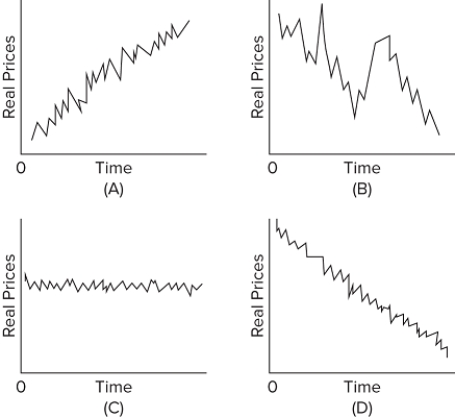 Which of the diagrams best describes the long-run path of real (inflation-adjusted)farm prices?
Which of the diagrams best describes the long-run path of real (inflation-adjusted)farm prices?A)A
B)B
C)C
D)D

Unlock Deck
Unlock for access to all 265 flashcards in this deck.
Unlock Deck
k this deck
69
An extraordinarily small crop of farm products due to drought causes
A)a large increase in the price of farm products because the demand for farm products is price inelastic.
B)only a slight increase in the price of farm products because the demand for farm products is income elastic.
C)only a slight increase in the price of farm products because the demand for farm products is income inelastic.
D)a large increase in the price of farm products because the demand for farm products is price elastic.
A)a large increase in the price of farm products because the demand for farm products is price inelastic.
B)only a slight increase in the price of farm products because the demand for farm products is income elastic.
C)only a slight increase in the price of farm products because the demand for farm products is income inelastic.
D)a large increase in the price of farm products because the demand for farm products is price elastic.

Unlock Deck
Unlock for access to all 265 flashcards in this deck.
Unlock Deck
k this deck
70
Over time, technological change has
A)reduced both the price elasticity and income elasticity of the demand for farm products.
B)reduced the minimum efficient scale of production in agriculture and increased the prices of farm products.
C)increased both price elasticity and income elasticity of the demand for farm products.
D)increased the minimum efficient scale of production in agriculture and reduced the prices of farm products.
A)reduced both the price elasticity and income elasticity of the demand for farm products.
B)reduced the minimum efficient scale of production in agriculture and increased the prices of farm products.
C)increased both price elasticity and income elasticity of the demand for farm products.
D)increased the minimum efficient scale of production in agriculture and reduced the prices of farm products.

Unlock Deck
Unlock for access to all 265 flashcards in this deck.
Unlock Deck
k this deck
71
Which of the following is correct?
A)The rapid expansion of foreign incomes will reduce U.S. agricultural exports.
B)A decrease in the international value of the dollar will reduce U.S. agricultural exports.
C)An increase in the international value of the dollar will reduce U.S. agricultural exports.
D)Changes in the international value of the dollar have no effect on U.S. agricultural exports.
A)The rapid expansion of foreign incomes will reduce U.S. agricultural exports.
B)A decrease in the international value of the dollar will reduce U.S. agricultural exports.
C)An increase in the international value of the dollar will reduce U.S. agricultural exports.
D)Changes in the international value of the dollar have no effect on U.S. agricultural exports.

Unlock Deck
Unlock for access to all 265 flashcards in this deck.
Unlock Deck
k this deck
72
Which of the following countries has the smallest percentage of its labor force employed in agriculture?
A)Madagascar
B)France
C)Brazil
D)United States
A)Madagascar
B)France
C)Brazil
D)United States

Unlock Deck
Unlock for access to all 265 flashcards in this deck.
Unlock Deck
k this deck
73
In 2017, farm employment constituted about
A)15.8 percent of total employment.
B)1.2 percent of total employment.
C)1.6 percent of total employment.
D)2.6 percent of total employment.
A)15.8 percent of total employment.
B)1.2 percent of total employment.
C)1.6 percent of total employment.
D)2.6 percent of total employment.

Unlock Deck
Unlock for access to all 265 flashcards in this deck.
Unlock Deck
k this deck
74
Since 1950, farm productivity has
A)advanced twice as fast as in nonfarm sectors of the economy.
B)lagged behind productivity advances in the nonfarm economy.
C)almost exactly matched productivity increases in the rest of the economy.
D)doubled.
A)advanced twice as fast as in nonfarm sectors of the economy.
B)lagged behind productivity advances in the nonfarm economy.
C)almost exactly matched productivity increases in the rest of the economy.
D)doubled.

Unlock Deck
Unlock for access to all 265 flashcards in this deck.
Unlock Deck
k this deck
75
Which of the following statements about U.S. agriculture is true as it relates to the past several decades?
A)The demand for farm products has declined, the supply of farm products has increased, and the price of farm products has declined.
B)The demand for farm products has become both more income elastic and more price elastic.
C)Minimum efficient scale has increased, the prices of farm products have declined, and the number of farms has declined.
D)The prices of farm products have increased, minimum efficient scale has declined, and the supply of farm products has been stagnant.
A)The demand for farm products has declined, the supply of farm products has increased, and the price of farm products has declined.
B)The demand for farm products has become both more income elastic and more price elastic.
C)Minimum efficient scale has increased, the prices of farm products have declined, and the number of farms has declined.
D)The prices of farm products have increased, minimum efficient scale has declined, and the supply of farm products has been stagnant.

Unlock Deck
Unlock for access to all 265 flashcards in this deck.
Unlock Deck
k this deck
76
The growing importance of export demand for American agriculture has
A)reduced the international value of the dollar.
B)had no significant effect on the stability of the demand for farm products.
C)destabilized the total demand for farm products.
D)stabilized the total demand for farm products.
A)reduced the international value of the dollar.
B)had no significant effect on the stability of the demand for farm products.
C)destabilized the total demand for farm products.
D)stabilized the total demand for farm products.

Unlock Deck
Unlock for access to all 265 flashcards in this deck.
Unlock Deck
k this deck
77
Which of the following statements is correct?
A)The price support program hastened the exodus of resources from agriculture.
B)The main beneficiaries of government price support assistance were the very low income farmers.
C)If the demand for agricultural products is inelastic, a relatively small decrease in supply will increase gross farm incomes.
D)There is a misallocation of resources in rural America because of absolute and relative increases in the size of the farm population.
A)The price support program hastened the exodus of resources from agriculture.
B)The main beneficiaries of government price support assistance were the very low income farmers.
C)If the demand for agricultural products is inelastic, a relatively small decrease in supply will increase gross farm incomes.
D)There is a misallocation of resources in rural America because of absolute and relative increases in the size of the farm population.

Unlock Deck
Unlock for access to all 265 flashcards in this deck.
Unlock Deck
k this deck
78
One consequence of the long-run problem faced by farms has been a
A)rapid increase in the price of farm output.
B)massive exit of workers from agriculture to other sectors of the economy.
C)smaller average farm size.
D)reduction in U.S. exports of farm products.
A)rapid increase in the price of farm output.
B)massive exit of workers from agriculture to other sectors of the economy.
C)smaller average farm size.
D)reduction in U.S. exports of farm products.

Unlock Deck
Unlock for access to all 265 flashcards in this deck.
Unlock Deck
k this deck
79
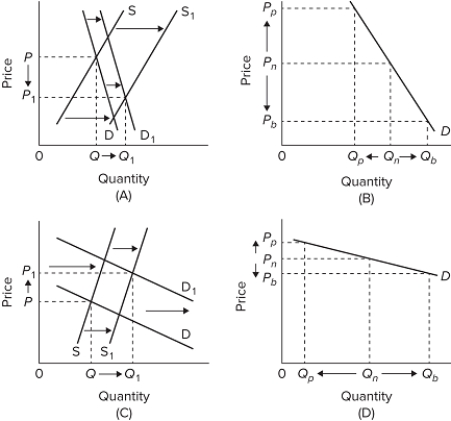 Which diagram best represents the problem faced by farms in the long run?
Which diagram best represents the problem faced by farms in the long run?A)A
B)B
C)C
D)D

Unlock Deck
Unlock for access to all 265 flashcards in this deck.
Unlock Deck
k this deck
80
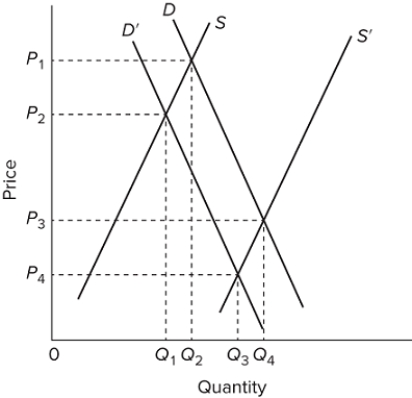 Refer to the diagram. Which of the following supply and demand shifts portray the long-run problem that farms face?
Refer to the diagram. Which of the following supply and demand shifts portray the long-run problem that farms face?A)S to S' and D to D'
B)S to S' and D' to D
C)S' to S and D' to D
D)S' to S and D to D'

Unlock Deck
Unlock for access to all 265 flashcards in this deck.
Unlock Deck
k this deck


